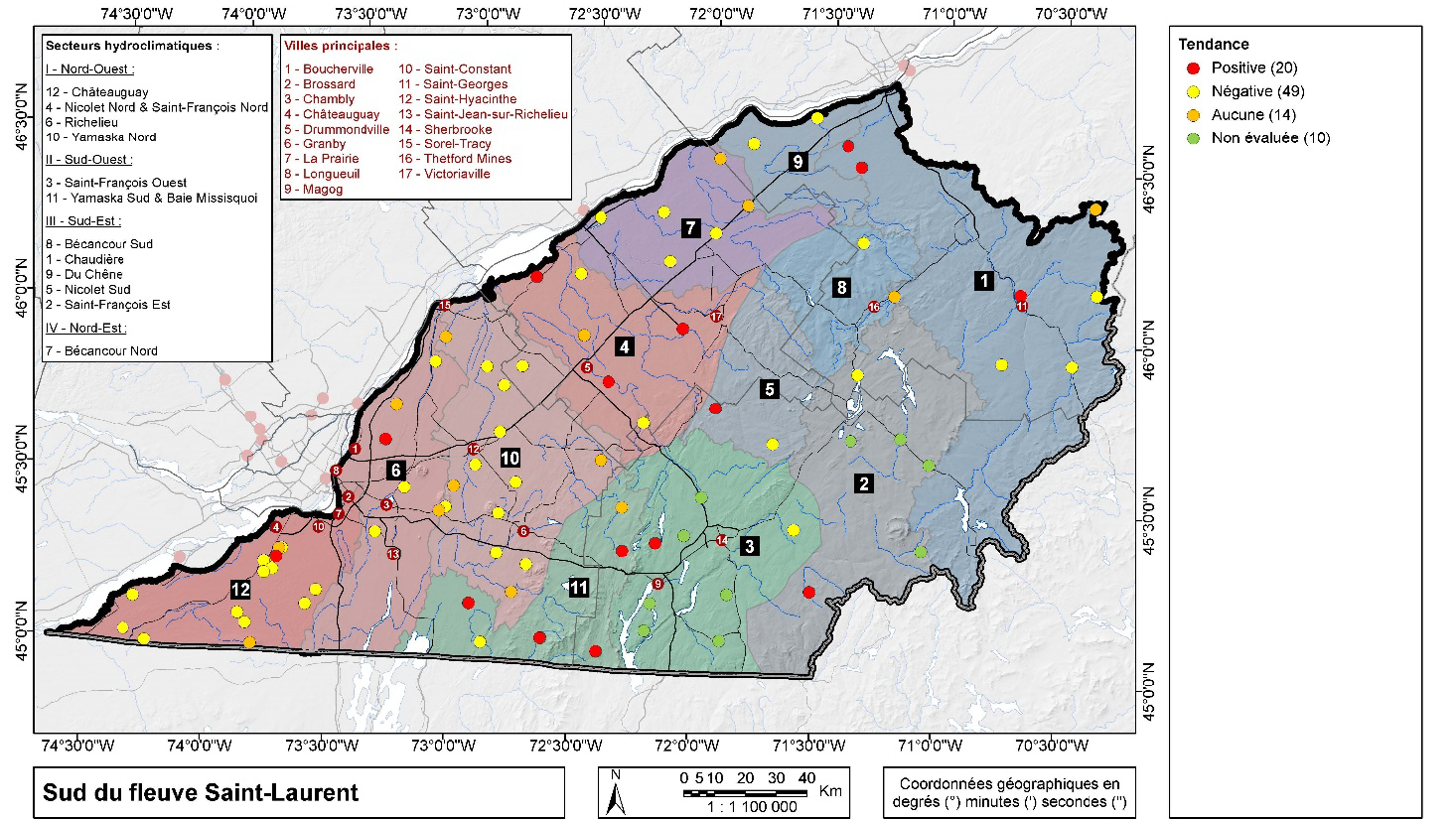Tools to Support Groundwater Management in the Face of Climate Change
Knowledge of changes in groundwater recharge will enable users to anticipate problems that could have a long-term effect on their water supply (quantity, quality, seasonal forecasts).
Project details
Principal(s) investigator(s)



Context
In 2007 the MELCC implemented a groundwater monitoring network (Réseau de suivi des eaux souterraines or RSESQ) with more than 250 piezometric stations located across southern Québec as well as in Umiujaq and the Magdalen Islands. Daily groundwater level and temperature data are collected from each station twice a year.
The analysis of the time series data collected by the RSESQ requires the development of tools to evaluate the effects of climate change on Québec’s groundwater, as well as its impact on low stream flow. To this end, the MELCC is funding three integrated research projects led by UQAM, INRS and Université Laval, while the Geological Survey of Canada is carrying out further research to complement the academic work.
Objective(s)
-
Optimize RSESQ to obtain data representative of Québec’s groundwater in order to evaluate the impact of climate change on this resource;
-
Develop indicators for groundwater status;
-
Develop tools for predicting groundwater status and trends;
-
Improve the understanding of groundwater recharge and inertia and the interaction between groundwater and surface water in the context of climate change.
Methodology
-
Use the data acquired through the Programme d’acquisition de connaissances sur les eaux souterraines du Québec to better define the hydrogeological context and the exploitation of groundwater near the RSESQ stations;
-
Develop groundwater status indicators and tools to analyze the data recorded at the RSESQ stations in order to identify changes in groundwater status;
-
Define standard conditions for groundwater recharge and its contribution to alluvial water tables;
-
Model groundwater recharge under past, present and future conditions, as well as the contribution of groundwater to stream base flow;
-
Perform integrated modelling of groundwater at the watershed scale and at the supraregional scale.
Results
The work done by the INRS consisted of:
Processing meteorological data
Developing tools to improve the management and use of RSESQ data
Defining the stations’ contexts
Correcting and processing their piezometric data
Characterizing their isolation conditions
Estimating the recharge at the sites where it is possible
The work done at UQAM included:
Defining typical conditions for aquifer recharge and groundwater emergence in watercourses
Modelling spatially distributed recharge in past, present, and future conditions
Modelling the contribution of groundwater to the base flows of watercourses
The work by Université Laval and the Geological Survey of Canada demonstrated the applicability of an integrated hydrological model simulating coupled flow (groundwater and surface water) in order to:
Provide a framework for developing water withdrawal management tools through the application of a large-scale integrated hydrological model
Identify the link between the signals observed at the RSESQ stations and the flows of watercourses in the context of climate change, using a smaller scale integrated hydrological model
Further to the analysis of the data from the RSESQ stations and their contexts, 33 stations were selected for monitoring groundwater and estimating recharge, which can be used to produce monitoring indicators and carry out periodic assessments of the state of the groundwater on a regional scale. The analysis of the time series of the 83 stations that underwent barometric analysis provided important information on the dynamics of groundwater in the study area. Furthermore, the analysis of the meteorological data enabled the designation of 12 hydroclimatic sectors divided into four groups. These results made it possible to identify certain gaps in the spatial representation of the stations and to make recommendations for the maintenance and future development of the RSESQ.
The modelling work on groundwater recharge and flow provided monthly recharge values and base flows over the entire study area for the period from 1961 to 2017. Recharge was simulated with two surface models (HydroBudget and the SWMB). The average annual recharge for the study area varies from 139 mm/year to 224 mm/year, depending on the model. The structure of the models and the calibration method (based on base flows) seems to explain the difference between the two models. Recharge calculation models were then used to simulate future changes using data from 12 climate scenarios. The results indicate that increases in recharge are to be expected during the winter and fall. The changes expected during the summer period are small and uncertain. The impact of climate change on the base flows simulated using underground models reflects changes in recharge, with a mitigation of the impacts in the spring. The increase in recharge in the winter does not mitigate the effect of the expected decline in the spring and potentially during the summer.
The results demonstrate that the RSESQ is a major resource for understanding aquifers’ reactivity to meteorological variations (Figure 1), for calibrating recharge modelling, and for simulating groundwater flows to estimate base flows of watercourses. The usefulness of Quebec’s hydrometric network for calibrating models and the need for gridded meteorological data were also demonstrated. The results made it possible to issue recommendations on the future management of the RSESQ and on the work to be implemented or continued in order to maintain and update knowledge on recharge, base flows and the state of aquifers in Quebec.

Figure 1: Trends in groundwater levels at RSESQ wells by hydroclimatic sector
Benefits for adaptation
Benefits for adaptation
The RSESQ allows for the assessment of groundwater level trends in relation to climate variations; it could, in the long term, determine the effects of climate change on the studied area.
Other possible applications of RSESQ data have also been identified, including defining isolation conditions, better identifying stations influenced by anthropogenic effects, and locally estimating recharge and hydrological balance parameters.
Scientific publications
Funding
This project is funded by the Government of Quebec and meets the objectives of the Plan pour une économie verte 2030.

Other participants
Ministère de l’Environnement et la Lutte contre les Changements Climatiques (MELCC)
Geological Survey of Canada
Related projects
510029